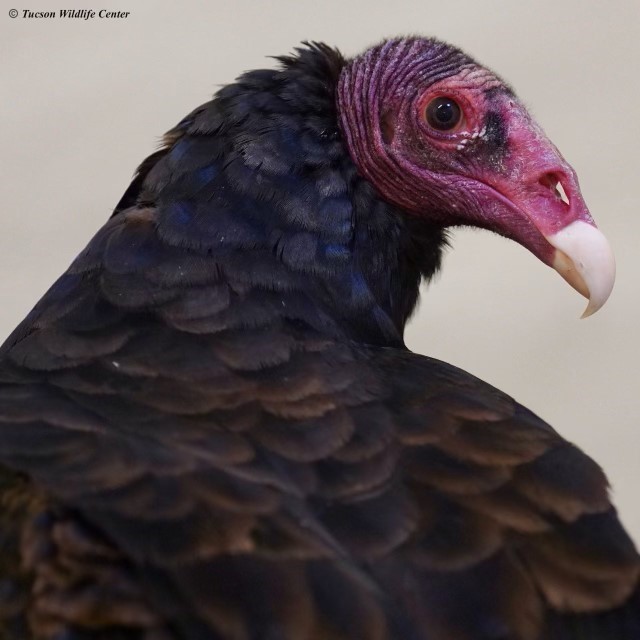
Turkey Vulture
This turkey vulture arrived at Tucson Wildlife Center QAR (Quiet, Alert, and Responsive), but extremely dehydrated and anemic. After an exam by our wildlife care team revealed no wounds or injuries, he was moved to one of our mammal care rooms to recover from his dehydration/emaciation while being observed. To protect the bird’s feathers from damage while perching, a tail wrap was carefully applied to allow natural movement while offering protection. This protection is important as damaged tail feathers can greatly affect the bird’s ability to fly properly, which is essential for his release and survival in the wild.
One of the unique aspects of turkey vultures is their exceptionally developed sense of smell compared to most other bird species. They have nostrils so large you can see right through them and have a greatly enlarged olfactory lobe in their brain, which gives them incredible sensitivity to smells. “These super-powered noses are designed to detect one thing: death. Turkey vultures are carrion feeders — a part of nature’s important cleanup crew. They ride air thermals, soaring with wings spread, detecting freshly rotting meat first with their nose and then with well-developed eyesight. Many birds that incorporate scavenging as part of their diet lack a strong sense of smell, whereas turkey vultures can sniff out some of the earliest signs of decay.” (https://www.cmnh.org/the-great-(and-gross)-turkey-vulture#)
If you would like to help patients like this turkey vulture
Another way you can contribute is to visit our “wish list” on Amazon by clicking on the Amazon Wish List button below. We appreciate it, as will all the wild animals in our care!
Click on the picture below to watch a video.
Don’t forget about the Jim Click for Millions raffle!
2024 Jim Click Millions for Tucson Raffle, for a chance to win a Jeep Wrangler Rubicon, 4xe Plug-In Hybrid.

